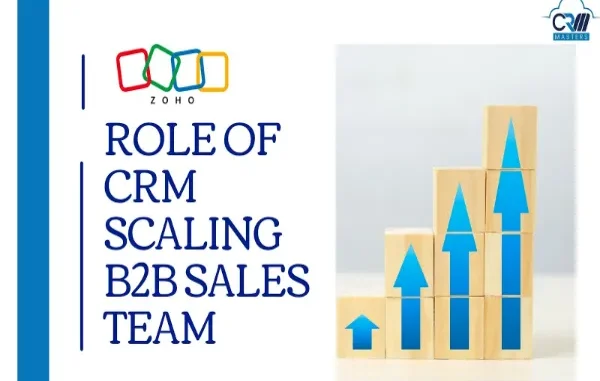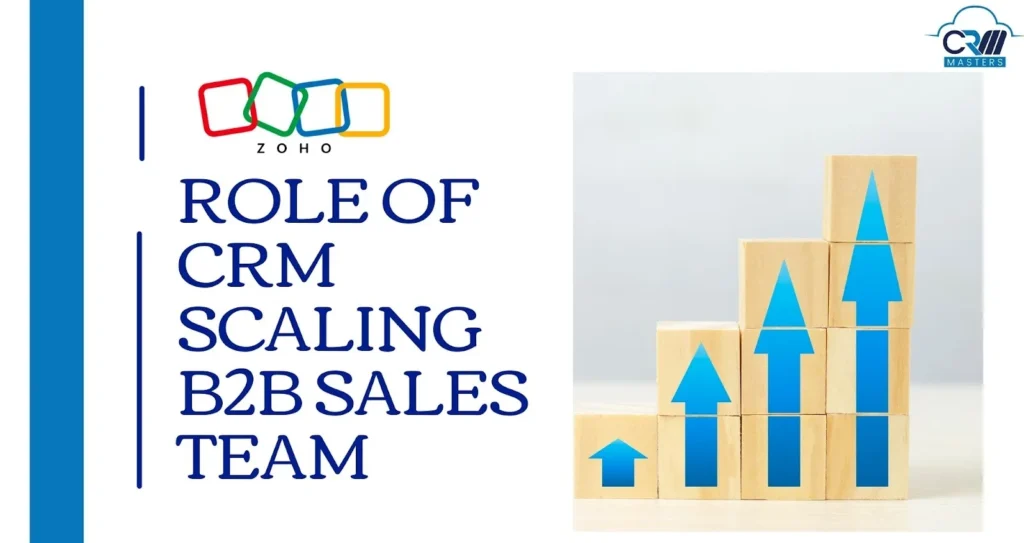

Today, Sales teams can’t only rely on raw talent and hard work for growth: they need data, process and automation. The CRM market was valued at $48.2 billion in 2020 and is projected to reach $157.6 billion by 2030, expanding at a CAGR of 13.9%, claims Grand View Research. The rise in adoption shows one clear fact that Customer Relationship Management (CRM) systems are now essential for successful B2B sales.
As we enter 2025, B2B sales leaders are at the crossroads of scaling teams and campaigns while ensuring that personal touch does not get lost. We will discuss in this blog the significance of CRM in scaling B2B sales teams and enabling a sales-led, customer-first approach, the features that businesses need to consider and how the dynamics of CRM trends in 2025 are shaping the sales process
Key Features of CRM that Drive b2b Sales Growth
To scale effectively in 2025, sales teams must leverage CRM features beyond the basics of contact management.
1. AI-Powered Lead Scoring and Insights
Today’s CRMs use AI and predictive tools to focus on leads that are most likely to buy. This allows sales reps to prioritize leads based on value and close deals more quickly.
2. Sales Forecasting
CRMs do real-time prediction on the pipeline to help managers direct resources, set the right targets, and predict changes in demand.
3. Advanced Integrations
B2B sales cycles are filled with various tools like marketing automation, LinkedIn outreach, quoting software, and support platforms. In 2025, CRMs in 2025 offer seamless integrations for a unified workflow.
4. Mobile CRM for Remote Sales Teams
With hybrid work becoming the norm, mobile CRM apps empower field reps to access customer data, update pipelines, and log interactions on the go.
5. Customizable Dashboards
Sales leaders can also develop dashboards for monitoring sales KPIs such as win rates, and revenue contribution and make data-driven decisions.
6. Omnichannel Communication
From email and calls to social media and chatbots, CRMs integrate multiple channels, ensuring sales teams maintain consistent and personalized communication.
Benefits of CRM for Scaling B2B Sales in 2025
1. Faster Leads Conversion
As B2B buying cycles become more complex, sales teams need tools that help them scale without losing efficiency or personalization. A modern CRM offers a wide range of benefits that directly impact growth, productivity, and customer experience.
2. Improved Sales Productivity
Automation of routine tasks such as data entry, lead assignment, and follow-up reminders frees sales reps to spend more time selling. This boost in efficiency allows growing teams to handle larger pipelines without additional overhead.
3. Accurate Sales Forecasting
With real-time pipeline visibility and AI-powered forecasting, sales leaders can predict revenue more precisely, allocate resources effectively, and set achievable growth targets for 2025 and beyond.
4. Personalized Customer Engagement at Scale
B2B buyers expect tailored interactions. CRMs enable sales teams to segment prospects, track their journey, and deliver personalized experiences—without overwhelming individual reps.
5. Seamless Collaboration Across Teams
As sales teams expand, collaboration becomes critical. CRMs act as a single source of truth where sales, marketing, and customer success can access updated account information, reducing miscommunication and duplication of work.
6. Higher Customer Retention & Upselling
Beyond acquisition, CRMs track renewals, satisfaction scores, and engagement, helping sales teams retain clients and uncover upsell opportunities—key drivers for sustainable growth.
What is the Role of the CRM for the B2B Sales Team?
Scaling a B2B business team requires more than just generating leads; it’s about capturing the right prospects, evaluating their potential, and moving only qualified opportunities forward. A CRM ensures this process is systematic, data-driven, and efficient. Here’s how:
- Centralized Lead Capture
CRMs integrate with websites, landing pages, chatbots, events, and social channels to automatically capture leads in one place. This eliminates manual tracking and ensures no opportunity is lost.
- Intelligent Lead Segmentation
Once leads are captured, CRMs categorize them by industry, company size, buyer persona, or geography. This segmentation allows sales reps to personalize outreach strategies and improve engagement.
- AI-powered Lead Scoring
Modern CRMs use predictive algorithms and machine learning to score leads based on behavior (email opens, webinar attendance, demo requests) and firmographics (industry, role, revenue). Reps know exactly which leads to prioritize.
- Lead Nurturing With Automation
Not all leads are ready to buy immediately. CRMs integrate with marketing automation tools to deliver drip campaigns, targeted content, and reminders keeping prospects engaged until they are sales-ready.
- Real-Time Lead Tracking
Sales teams can monitor every interaction like email clicks, calls, meetings, website visits within the CRM.This complete view allows salespeople to connect at the right moment with the right message.
How CRM Empowers Different Roles in a B2B Sales Team
Scaling a sales team means aligning multiple roles from SDRs to sales managers towards shared goals. A CRM ensures each role thrives:
1. Sales Development Representatives (SDRs): Automate lead assignments and follow-ups.
2. Account Executives (AEs): Gain visibility into opportunities and manage deals with AI recommendations.
3. Sales Managers: Track team performance with KPI dashboards and predictive forecasting.
4. Marketing Teams: Align campaigns with sales by integrating lead nurturing workflows.
5. Customer Success Managers: Manage post-sale relationships and identify upsell opportunities.
Choose Zoho CRM to Scale Your B2B Sales Team in 2025!
When it comes to scaling a B2B sales team, not all CRMs deliver the same impact. Zoho CRM stands out as a future-ready solution that combines AI, automation, and deep customization to help businesses grow efficiently in 2025.
Why Zoho CRM?
1. AI-Powered Insights (Zia)
Zoho’s AI assistant, Zia, predicts deal closures, analyzes email sentiment, and recommends the best next actions.
2. Advanced Sales Automation
From lead assignment to workflow automation, Zoho CRM reduces manual effort and lets your team focus on closing deals.
3. End-to-End Lead Management
Capture, score, and qualify leads with ease while nurturing them through personalized journeys.
4. Customizable for Any Industry
With custom modules, fields, and workflows, Zoho CRM adapts to your unique sales process making it ideal for scaling.
5. Seamless Integrations
You can easily connect Zoho CRM with marketing, finance, support, and third-party tools like LinkedIn, Slack, and QuickBooks for a unified ecosystem.
6. Cost-Effective Scaling
Unlike many enterprise CRMs, Zoho offers enterprise-grade features at an affordable price, making it ideal for both mid-sized businesses and growing enterprises.
Scale Smarter with Zoho CRM and Our Expertise!
In 2025, growth belongs to sales teams that work smarter not harder. With Zoho CRM’s AI, automation, and powerful integrations, you can turn scattered sales processes into a seamless growth engine. As a Zoho Premium Partner, CRM Master’s Infotech don’t just implement the tool but tailor it to your workflows, train your team, and ensure you achieve measurable results from day one.
Ready to transform your B2B sales team in 2025?
Contact us today and let’s build a scalable CRM strategy that drives results.






Leave a Reply